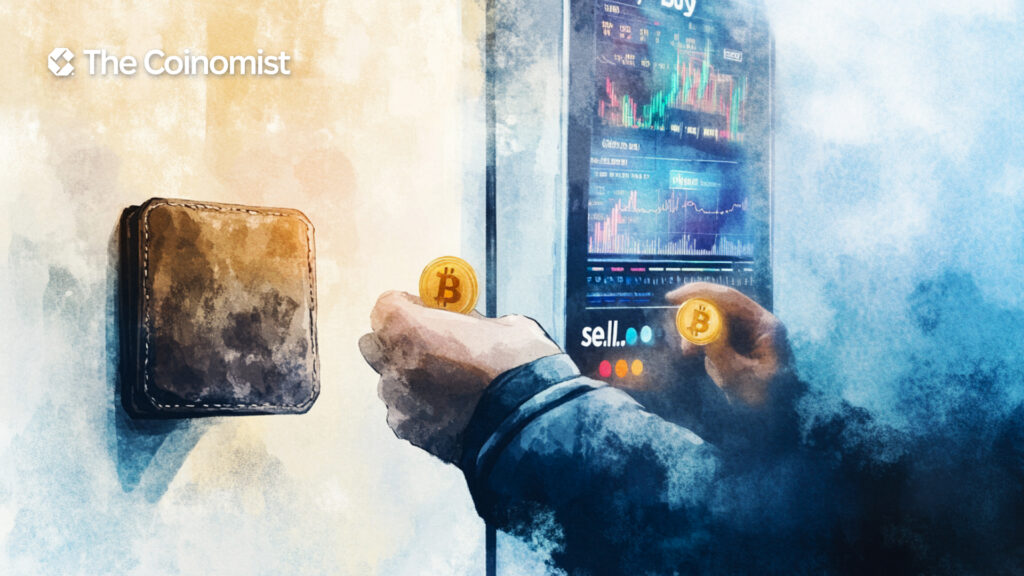How Is a Cryptocurrency Exchange Different from a Cryptocurrency Wallet?

A guide detailing the differences between cryptocurrency exchanges and wallets. Learn about their distinct roles, security features, liquidity, and user control in the digital asset ecosystem.
On this page
- What Is a Cryptocurrency Exchange?
- Features of a Cryptocurrency Exchange
- Types of Cryptocurrency Exchanges
- Pros of Using a Cryptocurrency Exchange
- Cons of Using a Cryptocurrency Exchange
- What Is a Cryptocurrency Wallet?
- Types of Cryptocurrency Wallets
- How a Cryptocurrency Wallet Works
- Pros of Using a Cryptocurrency Wallet
- Cons of Using a Cryptocurrency Wallet
- Key Differences Between Cryptocurrency Exchanges and Wallets
- Primary Purpose
- Security
- User Control
- Liquidity and Trading
- Accessibility
- Speed and Efficiency
- Backup and Recovery
- FAQs
- Is it better to keep crypto in a wallet or exchange?
- What is the difference between a crypto exchange and a hardware wallet?
- What is the difference between crypto and exchange?
- How is a cryptocurrency exchange different from a cryptocurrency wallet?
In the rapidly evolving world of cryptocurrency, understanding the key differences between a cryptocurrency exchange and a cryptocurrency wallet is essential for both new and experienced users. Although these two concepts are often mentioned together, they serve distinct functions in the ecosystem of digital currencies. To truly grasp the role each one plays, it’s important to delve into their respective purposes, security features, user interfaces, and how they interact with one another.
In this article, we will explore in great detail how cryptocurrency exchanges and wallets differ from one another. By the end of this guide, you’ll have a comprehensive understanding of both tools, how they are used, and which one may be more suitable for your needs depending on your cryptocurrency-related goals.
What Is a Cryptocurrency Exchange?
A cryptocurrency exchange is an online platform that allows users to buy, sell, and trade various cryptocurrencies. Exchanges serve as intermediaries between buyers and sellers of digital currencies and often offer additional features such as margin trading, futures trading, staking, and lending. Think of a cryptocurrency exchange as similar to a stock exchange, but instead of stocks, it deals with digital assets like Bitcoin, Ethereum, and countless other altcoins.
Features of a Cryptocurrency Exchange
- Trading Pairs: Cryptocurrency exchanges provide various trading pairs, allowing users to trade different types of cryptocurrencies. For example, you might exchange Bitcoin (BTC) for Ethereum (ETH) or US dollars (USD) for Bitcoin.
- Liquidity: One of the primary roles of an exchange is to provide liquidity, which ensures that users can buy or sell assets quickly without causing significant price fluctuations. High liquidity makes it easier to convert your crypto into fiat or another cryptocurrency.
- Fees: Most exchanges charge fees for transactions. These fees can range from a small percentage of the trade to flat-rate fees, depending on the platform and the type of transaction. Some exchanges also charge fees for depositing or withdrawing funds.
- Market Orders and Limit Orders: A cryptocurrency exchange typically allows two main types of orders:
- Market orders: Buy or sell orders executed immediately at the current market price.
- Limit orders: Orders that are only executed when the cryptocurrency reaches a specified price.
- Account Verification: Many exchanges require users to complete a Know Your Customer (KYC) process, especially when dealing with fiat currencies. This typically involves providing proof of identity, which adds a layer of security and compliance with financial regulations.
Types of Cryptocurrency Exchanges
- Centralized Exchanges (CEX): These exchanges are run by centralized entities that manage all aspects of the trading process. Users trust the platform to handle transactions, order matching, and custodial services. Examples include Coinbase, Binance, and Kraken.
- Decentralized Exchanges (DEX): Unlike centralized exchanges, decentralized exchanges allow users to trade directly with each other without relying on a central authority. Examples include Uniswap and SushiSwap. These exchanges typically offer greater privacy and control, but often at the cost of ease of use.
- Peer-to-Peer (P2P) Exchanges: In P2P exchanges, users can trade directly with one another, with the platform acting only as an escrow service. Examples include LocalBitcoins and Bisq.
Pros of Using a Cryptocurrency Exchange
- High Liquidity: Exchanges provide access to a large pool of buyers and sellers, which means you can trade assets quickly and at competitive prices.
- User-Friendly Interface: Most exchanges have intuitive interfaces that make it easy for both beginners and experienced traders to place orders and track their holdings.
- Variety of Cryptocurrencies: Exchanges offer a wide range of cryptocurrencies, from Bitcoin and Ethereum to lesser-known altcoins, providing users with diverse investment opportunities.
- Security Measures: Leading exchanges implement advanced security protocols, such as two-factor authentication (2FA), cold storage, and encryption, to protect users' funds.
Cons of Using a Cryptocurrency Exchange
- Custodial Nature: When you store your crypto on an exchange, the platform holds your private keys, meaning they control access to your funds. If the exchange is hacked or goes bankrupt, your assets may be at risk.
- Fees: Some exchanges charge high fees, especially for withdrawing funds or executing trades on high volume.
- Risk of Hacks: Even though most exchanges have strong security measures in place, they remain prime targets for hackers due to the large amounts of cryptocurrency they hold.
What Is a Cryptocurrency Wallet?
A cryptocurrency wallet is a digital tool that allows users to store and manage their private and public keys, enabling them to securely interact with the blockchain network. Unlike a cryptocurrency exchange, a wallet does not provide the ability to trade cryptocurrencies directly; its primary function is to store them and enable secure transactions. Wallets come in different forms and offer varying levels of security, convenience, and functionality.
Types of Cryptocurrency Wallets
- Hot Wallets: These wallets are connected to the internet and are more convenient for daily use. Hot wallets are software-based and can be accessed via desktop, mobile apps, or web browsers. Examples include Exodus, Electrum, and MetaMask.
- Cold Wallets: Cold wallets are offline storage solutions that are not connected to the internet, offering a higher level of security. Examples include hardware wallets like Trezor, Ledger, and paper wallets. Cold wallets are typically used for long-term storage of cryptocurrency and are considered much safer from hacks.
How a Cryptocurrency Wallet Works
- Private Key: The private key is a secret code that allows users to sign transactions and access their cryptocurrency holdings. If you lose your private key or someone else gains access to it, you lose control over your funds.
- Public Key: The public key is like an account number that you can share with others to receive cryptocurrency. It is derived from the private key, but cannot be used to access your funds.
- Transaction Signing: When sending cryptocurrency, the wallet uses the private key to sign the transaction, proving the ownership and authorization of the transfer.
Pros of Using a Cryptocurrency Wallet
- Ownership and Control: With a wallet, you are the sole owner of your private keys, meaning you have full control over your funds. This is often referred to as the principle of “not your keys, not your coins.”
- Security: Cold wallets, in particular, offer excellent security since they are not connected to the internet and are less vulnerable to hacking.
- Privacy: Wallets, especially those with anonymous features like hardware wallets and privacy-focused software wallets, allow for greater control over your personal data and privacy.
Cons of Using a Cryptocurrency Wallet
- Responsibility: You are solely responsible for keeping track of your private keys. Losing them means losing access to your funds permanently.
- Less Convenient for Trading: Wallets are designed for storage, not trading. If you want to trade your cryptocurrency, you will need to transfer it to an exchange.
- Fees for Transactions: While wallets themselves are free, some transactions (especially those involving cold wallets) may incur network or gas fees when sending cryptocurrency.
Key Differences Between Cryptocurrency Exchanges and Wallets
Primary Purpose
- Exchange: The main purpose of a cryptocurrency exchange is to facilitate the buying, selling, and trading of cryptocurrencies. It acts as an intermediary, enabling users to trade their assets.
- Wallet: A cryptocurrency wallet's primary function is to store and manage your digital assets. It provides a secure way to send and receive cryptocurrencies while maintaining full control over your private keys.
Security
- Exchange: Exchanges generally offer strong security features such as two-factor authentication, encryption, and cold storage for funds. However, they are still centralized platforms, meaning they are potential targets for hacks.
- Wallet: Wallets offer enhanced security, especially cold wallets, because they store assets offline. Since the private keys are not stored online, they are less susceptible to hacks. However, if you lose your private key, you lose access to your funds.
User Control
- Exchange: On exchanges, the platform holds the private keys to your cryptocurrency, meaning they control access to your funds. You are relying on the exchange’s security measures to keep your assets safe.
- Wallet: With a wallet, you have full control over your private keys and therefore your assets. This level of control is a major advantage for those who prioritize security and autonomy over convenience.
Liquidity and Trading
- Exchange: Exchanges provide high liquidity and allow for real-time trading. They offer various order types and trading pairs, making it easier to buy, sell, and exchange cryptocurrencies quickly.
- Wallet: Wallets do not offer the ability to trade cryptocurrencies directly. To trade, you would need to transfer your crypto to an exchange.
Accessibility
- Exchange: Exchanges are generally easy to access and use, even for beginners. They typically have user-friendly interfaces and offer educational resources to help you get started.
- Wallet: Wallets can range from beginner-friendly to complex, depending on the type (e.g., hardware wallets can be more complicated to set up). However, once set up, they are simple to use for sending and receiving cryptocurrencies.
Speed and Efficiency
- Exchange: One of the key advantages of using a cryptocurrency exchange is the speed and efficiency with which you can execute trades. Exchanges are designed to provide real-time transactions, allowing users to quickly react to market movements and take advantage of price changes. This makes exchanges particularly valuable for active traders and investors who need to execute high-volume transactions within a short period of time. Additionally, many exchanges offer advanced trading features such as margin trading, automated trading bots, and stop-loss orders, which can further enhance trading efficiency.
- Wallet: While wallets offer excellent security for holding and managing assets, they are not designed for trading or quick market activity. The process of sending and receiving cryptocurrency from a wallet may take longer than executing a trade on an exchange, especially when considering network confirmation times and transaction fees. For instance, when sending Bitcoin, users need to wait for the transaction to be confirmed by the blockchain network, which can take anywhere from a few minutes to several hours depending on the network’s congestion. As a result, wallets are primarily used for long-term storage rather than for active trading.
Backup and Recovery
- Exchange: Most exchanges provide backup and recovery options in the event that you lose access to your account. These usually come in the form of account recovery tools, such as email verification or security questions. However, this is not always foolproof, and if the exchange experiences a technical issue or security breach, you might lose access to your funds. Additionally, since exchanges hold your private keys, the responsibility for backup and recovery rests with the platform itself, leaving you dependent on their security measures.
- Wallet: With a cryptocurrency wallet, particularly a hardware wallet, you are responsible for backing up your private keys. Many wallet providers offer recovery phrases (often 12 or 24 words) that can be used to restore access to your wallet in case it is lost or damaged. This gives users a sense of control, but it also means that the security of the wallet is entirely in the hands of the user. Losing the recovery phrase or private key means permanent loss of access to the stored assets. Therefore, users must ensure they securely store these backups in multiple, safe locations to prevent the risk of losing access to their funds.
This comprehensive comparison between cryptocurrency exchanges and wallets should give you a clearer understanding of their distinct roles in the cryptocurrency ecosystem. Whether you're looking to trade, store, or secure your digital assets, it's essential to understand when and how to use each tool to meet your specific needs.
FAQs
Is it better to keep crypto in a wallet or exchange?
It is generally safer to store cryptocurrencies in a wallet, especially a cold wallet, because you control the private keys. Keeping crypto in an exchange exposes it to the risk of hacks or platform failure. However, if you want to trade frequently, keeping your funds on an exchange might be more convenient.
What is the difference between a crypto exchange and a hardware wallet?
A crypto exchange is an online platform for buying, selling, and trading cryptocurrencies. A hardware wallet, on the other hand, is a physical device used for securely storing cryptocurrencies offline. A hardware wallet offers higher security but is not used for trading, while an exchange allows for easy trading but involves a higher risk of theft.
What is the difference between crypto and exchange?
Cryptocurrency is the digital currency itself, such as Bitcoin or Ethereum, while an exchange is a platform where cryptocurrencies are bought, sold, or traded. The exchange facilitates transactions and manages liquidity, while cryptocurrencies are the assets being traded.
How is a cryptocurrency exchange different from a cryptocurrency wallet?
A cryptocurrency exchange is used for buying, selling, and trading cryptocurrencies, while a cryptocurrency wallet is used for storing and managing cryptocurrencies. An exchange provides access to the market, while a wallet ensures the security of your holdings.
The content on The Coinomist is for informational purposes only and should not be interpreted as financial advice. While we strive to provide accurate and up-to-date information, we do not guarantee the accuracy, completeness, or reliability of any content. Neither we accept liability for any errors or omissions in the information provided or for any financial losses incurred as a result of relying on this information. Actions based on this content are at your own risk. Always do your own research and consult a professional. See our Terms, Privacy Policy, and Disclaimers for more details.




















